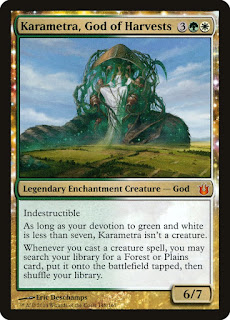For those in the gaming community, this weekend marks an important event in the on-going history of Magic: The Gathering. In case you don't know, Magic: The Gathering (MTG) is a strategy card game created in 1993 by mathematics professor Richard Garfield and marketed by Wizards of the Coast. Currently the world's most popular trading card game, MTG outpaces both Yu-Gi-Oh! and Pokemon and was recently recognized to be the "world's most complex game." The comprehensive rule-book currently runs to nearly 200 pages.
MTG, as its name implies, involves players acting as dueling mages who cast their spells by playing various card types (creatures, instants, sorceries, enchantments, artifacts, etc.) and managing resources (mana, energy) in the hopes of outmaneuvering and defeating their opponents. These spells can be cast at different times and at different speeds, leading to an intricate web of card interactions. Moreover, even though there is a complex set of rules governing gameplay, individual cards frequently allow players to violate those rules on a conditional basis--adding to the game's complexity. A variety of MTG formats exist (both 1v1 and multiplayer) which allow players to use cards from different card sets (in both paper and online versions). Several of these sets are released each year, which both add to the evolving dynamics of the game and continue to develop its rich mythologies and story-lines. Lore and aesthetics are important aspects of the game's enduring appeal.
This weekend the newest set is being released--Theros: Beyond Death--which marks the return of the game to Theros, a realm of the MTG multiverse modeled on the Graeco-Roman past. Although much of the game's early story-line took place inside its own self-generated sci-fi fantasy universes (such as Dominaria and Phyrexia), later expansion sets came to be inspired by various world cultures--such as medieval Japan (Kamigawa), early modern Europe (Innistrad), colonial South America (Ixalan), central and south Asia (Tarkir and Kaladesh), and, in the case of Theros, classical antiquity.
Are these depictions historically accurate? No. To be clear, the realm of Theros is an alternate classical universe. There are gods, demigods, archons, titans, satyrs, centaurs, gorgons, and hydras, as well has human cultures loosely based on Athens and Sparta. The gods make war with one another, as do the various sentient beings that populate this classical corner of the Magic multiverse. The fact that Theros is only an approximation of the ancient world allows for more creative license on the part of the games developers than would be the case with a more strictly historically accurate depiction.
If anything, this quasi-classical world might inspire players to look more closely at the historical period it is meant to reflect. In my view, this is a plus. There are many areas of popular culture--gaming included--in which the ancient world is represented with varying degrees of accuracy. Assassin's Creed is another prime example. For the most part, the target audience of such productions are not classical scholars, but the general public. Yet, for many people, film, television, novels, and gaming are their first point of contact with depictions of the ancient world. Academics, instead of dismissing them as "inaccurate" and "popular," would do well to pay attention to how how antiquity is engaged with by means of such cultural products. They provide important opportunities for learning and debate both inside and outside the classroom.
So, this pre-release weekend, if you're a classics nerd or gamer (or both), you might want to take a moment to investigate or reflect upon Magic: The Gathering's creative and intriguing take on the Graeco-Roman world.
If anything, this quasi-classical world might inspire players to look more closely at the historical period it is meant to reflect. In my view, this is a plus. There are many areas of popular culture--gaming included--in which the ancient world is represented with varying degrees of accuracy. Assassin's Creed is another prime example. For the most part, the target audience of such productions are not classical scholars, but the general public. Yet, for many people, film, television, novels, and gaming are their first point of contact with depictions of the ancient world. Academics, instead of dismissing them as "inaccurate" and "popular," would do well to pay attention to how how antiquity is engaged with by means of such cultural products. They provide important opportunities for learning and debate both inside and outside the classroom.
So, this pre-release weekend, if you're a classics nerd or gamer (or both), you might want to take a moment to investigate or reflect upon Magic: The Gathering's creative and intriguing take on the Graeco-Roman world.














